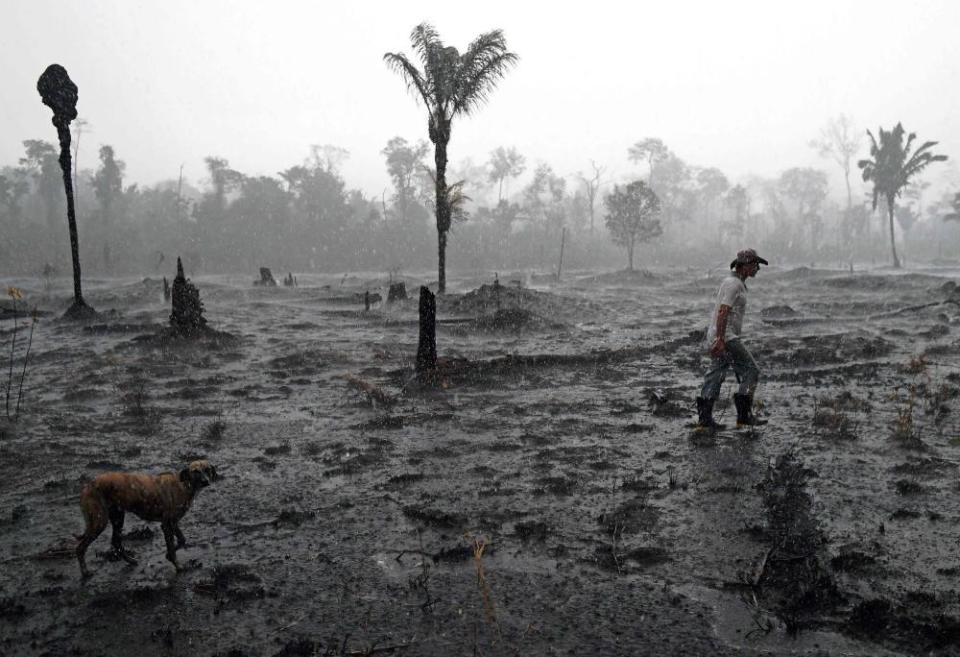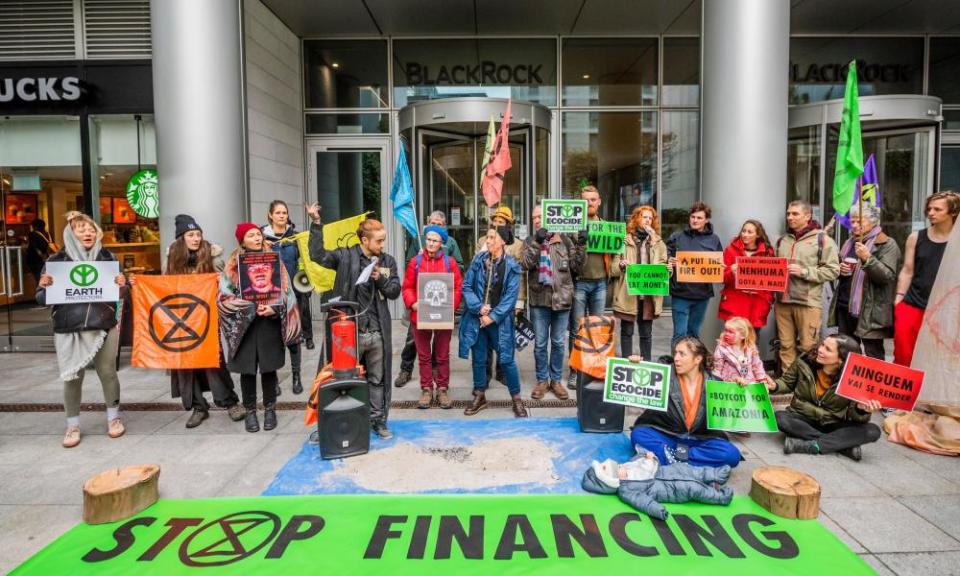Revealed: UK banks and investors' $2bn backing of meat firms linked to Amazon deforestation

British-based banks and finance houses have provided more than $2bn (£1.5bn) in financial backing in recent years to Brazilian beef companies which have been linked to Amazon deforestation, according to new research.
Thousands of hectares of Amazon are being felled every year to graze cattle and provide meat for world markets.
As well as providing financial backing for Minerva, Brazil’s second largest beef exporter, and Marfrig, its second largest meat processing company, UK-based financial institutions held tens of millions of dollars worth of shares in JBS, the world’s largest meat company.
All three meat companies have been linked to deforestation in their supply chains, though they say they are working to monitor their suppliers and mitigate risks.
Related: Revealed: rampant deforestation of Amazon driven by global greed for meat
Marfrig, a Brazilian meat company that has supplied fast-food chains around the world, was found to have bought cattle from a farm that had been using deforested land last year.
JBS remains unable to monitor a significant proportion of its suppliers despite operating deep in the Amazon, while last year Marfrig admitted that more than half of the cattle it slaughtered originated from indirect suppliers that it could not monitor.
According to a joint investigation by the Guardian, Unearthed and the Bureau of Investigative Journalism, financial data between January 2013 and May 2019 shows that HSBC underwrote $1.1bn of bonds for Marfrig and $917m for Minerva. They also held nearly $3m in JBS shares.
Schroders held $14m in Marfrig bonds and $12m in Minerva bonds, while Standard Life Aberdeen held $10m in Marfrig bonds and $3m in JBS shares. Prudential UK had $23m in JBS shares and $5m in Minerva bonds.
Banks frequently hold bonds and shares on behalf of clients who invest through their asset management funds.
Other European-based institutions provided an additional $2.1bn of backing. Santander underwrote $1.4bn worth of bonds across the three companies. Deutsche Bank underwrote $69m worth of Marfrig bonds and loaned JBS $57m.
European institutions also held significant shares in JBS: Crédit Agricole, Deutsche Bank and Santander invested $37m, $12m and $7m respectively. All data was correct as of May 2019.
The European Commission is considering new financial reporting rules in light of the coronavirus crisis that would require banks, insurance firms and listed companies to disclose their exposure to biodiversity loss and pandemic risk. Scientists have warned that deforestation is increasing the risk of new diseases emerging.
Related: Forest fire season is coming. How can we stop the Amazon burning?
Some of the financial institutions told the Guardian they were engaging with the three companies over deforestation, and could reconsider their support if they saw insufficient progress.
The three meat companies say they are confident that the farms their slaughterhouses directly purchase cattle from are not involved in deforestation, but they also accept they cannot know the origin of some animals that have passed through other farms beforehand.
In a statement, JBS said it had blocked thousands of direct suppliers for breaking rules concerning deforestation and was working with the Brazilian government and industry on solutions for monitoring indirect suppliers.
Minerva said there was “no accessible and reliable data and statistics on the complete cattle traceability chain” in Brazil and that it was evaluating a new tool developed by the National Wildlife Federation and University of Wisconsin to monitor indirect suppliers. Marfrig said it was developing a tool to combat the risk of buying from indirect suppliers which it cannot monitor.
“No UK financial institution should be profiting from the destruction of rainforest or other precious habitats in Brazil or elsewhere. If the government’s claims to global leadership on climate are to have any meaning at all, it must stop turning blind eye to the links between UK banks and deforestation, by introducing strong regulation, harsh penalties and strict provisions on full public transparency of environmental and social impacts of all investment portfolios,” said Caroline Lucas, Green MP for Brighton Pavilion.

In response to the findings, a spokesperson for Aberdeen Standard Investments said: “There are definitely shortcomings in supply chain monitoring for the entire beef industry in Brazil, but these practices are improving across the industry and investor activism plays an important role in this development ... At present, we remain invested but this may change depending on a number of factors.”
Schroders said it was in dialogue with both Minerva and Marfrig and that, “if we did not see these signs of progress, we would certainly consider changing our recommendations for these companies.”
Deutsche Bank said it did not finance activities where there is clear and known evidence on clearing of primary forests, areas of high conservation value or peat lands, illegal logging or uncontrolled and/or illegal use of fire. Crédit Agricole said it did not finance projects on deforested land with high biodiversity value.
Prudential UK said it was actively engaging with companies operating in the Amazon region to find solutions. HSBC said it conducted reviews of clients for their commitment to sustainable business practices. Santander said it conducted annual reviews of more than 2,000 clients in Brazil, including those that are large soy producers, soy traders and meatpackers, especially about their supply chain.

 Yahoo Finance
Yahoo Finance 